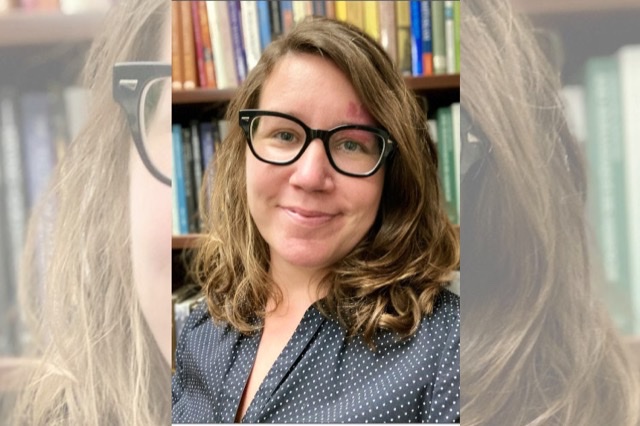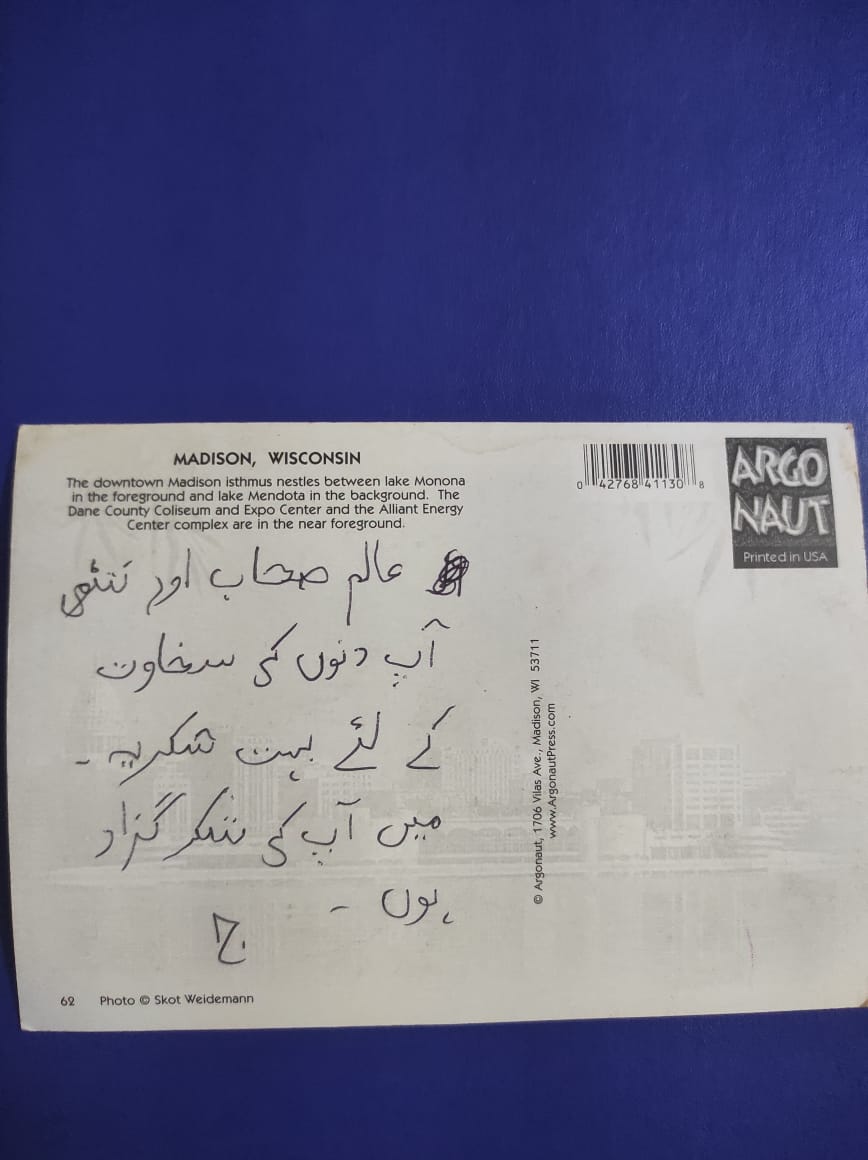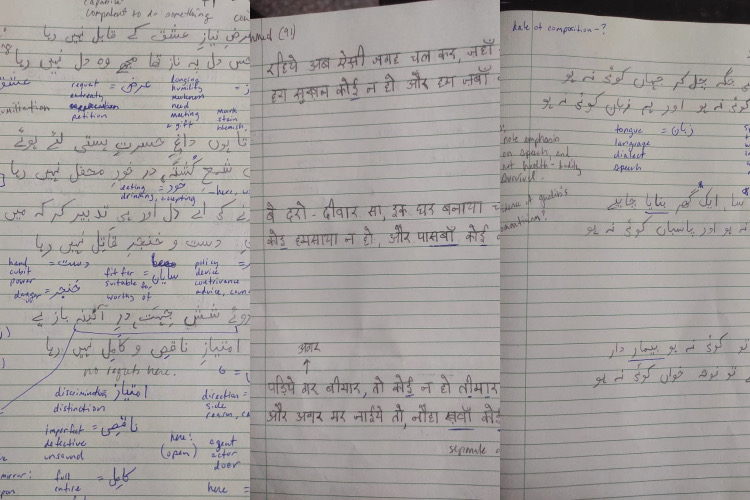
New Delhi/ Shaista Fatima
It was on 9/11, the day Al Qaeda terrorists rammed passenger airlines into twin World Trade Towers in New York and another was made to fall over the Pentagon that made Jaclyn Michael, Assistant Professor of Asian Religions at the University of Tennessee at Chattanooga, the USA, study Muslims, and their mindsets.
Jaclyn, who is in her late thirties says the twin tower attack of 9/11 became her inspiration to study Muslims and try to reach out to the root cause of the anger felt towards their community and the feeling of disparity of the Muslim diaspora around the world.
She completed her PhD from the University of Wisconsin, Madison in 2016. Currently, she is working on a book closely related to her thesis "Indian Muslims in Performance: Ethics, History, and Politics of Belonging" that makes her covers the fields of Religious Studies, Islamic Studies, Islam in the South, Southeast Asia, and Hinduism. She did her masters in Islamic studies from Boston University and graduated cum laude from Harvard University with a concentration in Middle Eastern Studies.
Jaclyn says that she is an Indian by heart and has many water families in the country. She normally visits India during summer for her ongoing research for her book where she loves to gobble golgappas.
She is not a fan of American food and prefers Indian staples "daal-chawal", rajma-chawal" instead. Given an opportunity, she’d like to teach and make a life here in India. Awaz-the Voice spoke to her a day before she completed her summer sojourn in India. Excerpts from Shaista Fatima's exclusive conversation with her:
What inspired you to study Asian religions and Islam particularly?
Well, I was pursuing my graduation when 9/11 happened. So, we as undergrads had to study a foreign language, I somehow took up Arabic, it fascinated me but I had no purpose, no aim..then 9/11 happened and suddenly my avenues of exploring the world of Islam and practicing Muslims expanded. A paradigm shift came after that event and it pained my heart to see the disparity in the treatment of the community. I wanted to go to Iran after college but my visa for Iran was rejected as I am an American and it is difficult for Americans to get visas to enter the country.
What exactly did you see and how did India come into the picture?
A lot was happening, and the perception of Muslims had changed completely. I wanted to learn Persian but after my visa for Iran was rejected, I began searching for another university to learn the language…. that is when India came into the picture. I learned about this school in Hyderabad, Andhra Pradesh where I could learn Persian and went there.
How was your experience here?
I first came to India in 2006, I didn't know anyone here, it was foreign to me, and I stayed here for almost a year. And then I discovered that there was a significant Muslim community here because in the US we are taught that India is a land of Hindus and Gandhiji is the father of everything. Since then, I am trying to learn more about Muslims in India. Most people when they research this subject, look at history and politics but I am not interested in history or politics. I think when you consider culture, theatre, and films you see a different presence of Muslims than what is written in historical pieces or expressed in politics. There's this fixation on Muslims and that’s what I am trying to understand.
How has your perception changed after coming to India and how Muslims of India are different from Muslims of the world?
Well, yes, I learned that India has a huge population of Muslims as well and they are a social community just like any other community, there is diversity even among Muslims. For example, Muslims of Sarita Vihar are going to be different from Muslims of Seelampur and Hauz Khas. I think that I am fascinated with Delhi as it is such a Muslim city. I look around and see the presence of Old Muslims in the form of ancient monuments, although they are in disrepair. I guess that's what inspires me to understand the situation of Muslims in Delhi more and I think that I can do that in the best way through culture. This explains my focus on films, theatre, film, and also the heritage walks in Delhi that happen at monuments and forts built by Muslims.
So primarily culture is your area of research...?
My inspiration for theatres would be Munshi Premchand’s 1924 play “Karbala”. In this play, the story of Muharram and Ashura is described when Prophet Mohammad’s grandson was killed by other Muslims so in Karbala, Premchand is thinking about how to build unity among the Hindus and Muslims by using this history. He thought this history would inspire the communities to work harmoniously. I have read his letters about this play and he says that Hussain was such an emaandar (honest) character and if only Hindus would know about Hussain they would respect Muslims and work together to fight the new Yazeed(a villain in Islamic history) that is the British's colonial rule.
How many languages can you read and write in?
Like theek se..? (Competently)…Ummm… I guess Persian, Arabic, Devanagari, and Urdu but I am most comfortable with Urdu…

Jaclyn's handwritten postcard to Niti Phool and Sayeed Alam
Were you interested in Muslim culture before 9/11 happened?
No, like I mentioned before I was studying Arabic as it was mandatory to take up a foreign language but koi maqsad nahi tha (I had no aim). I took up Arabic just cause the language fascinated me a lot. It was only after 9/11 that I realised I needed to learn more about Muslim history and culture in addition to Arabic.
Can you share more about the main topic of your thesis and your current research?
I think my research is focused on what is the nature of the Muslim character in this play or what is the nature of the Muslim character in this film. But now I think that is not an interesting question to ask, I think now the question should be what is this Muslim character being used for… and I think it's not about Muslims but rather something about Indian society, India as a whole, as a national idea. Because the depictions of Muslims in film and theatre, they're very often not realistic. They are sometimes terrorists only and other times only nationalists. The depictions are so conflicting that I think that there's a more important question which is why are people putting these ideas on Muslim characters. Does this make sense?
Yeah...
So, what I think is what does this character say about Muslims as a community... But again I think that's not the important question. Nehru had a vision where he saw unity between all castes and tribes and religious communities but there probably never has been. So I think that Muslim characters serve a purpose which allows people to express concerns about division and unity in Indian society.
Are you somewhere disappointed about the portrayal of Muslims, especially in the entertainment diaspora?
Yeah, but it's not just India, sirf India ki baat nahi hai..it happens in America as well..it happens in Europe too..almost everywhere...Negative depictions are a pervasive problem.
What theatre groups you have worked with, movies that you researched..?
Well, of course, Garam Hawa, the 1974 film. New films like My name is Khan (bekar film hai..), Kurban is another one I have written about. Some theatre groups in Delhi I have worked with are Pierrot’s Troupe, and performers like Mehmood Farooqi known for their Dastan Goi. I have met Arvind Gaur and the Asmita theatre group a couple of times.
So what are the similarities or the dissimilarities according to you in those movies..?
In those movies, the story is trying to understand Muslims' relationship to violence and most of the time there are bad Muslims sometimes there are good Muslims. My name is Khan is a very strange film, but it is interesting as all those films happened in America but why not India, why not Mumbai, why not Delhi? Why are they all set in America..that’s an interesting question.
What is that one change that you’d like to see in the movies..?
umm...I don’t know...I am not very political you know…

Jaclyn's notebook with Hindi, Urdu couplets
How are real Muslims different from historical Muslims of the theatrical world?
There's always a class issue and always a caste issue, often in theatrical representation there is always the elite Muslims from upper casts, you know for example Syeds, there could be more diversity in these representations..one often doesn't get to see the lower class or lower caste Muslims in theatres.
Do you think Muslim society is a patriarchal society?
Yes, but it's not the only one. I often wonder why Muslims are the only community assumed to be patriarchal. I have many Muslim women friends, mostly American, but then some of them are Hindustani and they don't agree with the idea that patriarchy is acceptable or inevitable for their community. They say that the Prophet Muhammad never taught these things. But things are changing little by little. Muslims are raising awareness about discrimination within their community so maybe the situation will change for a better world. Even in an American household, I’d be expected to do more work since I am a woman…I may not have to cook food but then they’d expect me to know how to cook food since men are lazy… yeah the situation is similar everywhere but Hindustani men take the price.
Any memory of India that is precious to you and how many times have you visited India?
I have a lot of good memories and some not-so-good memories. But overall India is very important to me, which is why I keep returning. I have many friends here whom I take as my family. I have many families here. Performing in the Pierrot's Troupe play Sons of Babur was memorable and something very close to my heart as I never thought I would act in a play. I remember receiving advice from Tom Alter about acting which was helpful.
How many cities have you travelled to in India?
Hyderabad, Lucknow, Jaipur, Srinagar, Delhi, Mumbai, Nainital, Mussoorie, Kerala.
Have you seen India developing or evolving in these years?
Well, yes, India is growing and developing especially in cities like Delhi. Population and infrastructure are increasing but at the same time, I think people's social mentality is getting smaller. Discrimination and violence against racial, religious and ethnic minorities are increasing and it is occurring in many places around the world even in America there is a huge spike in these forms of discrimination. I think the problem is capitalism, the rich are getting richer and the poor is getting poorer while the middle class is fighting daily to lead a dignified life thus they seem to have no concern about the developing situations. In America as well as India the Hindutva is rising and the middle class is not speaking up against fascism, then there is white supremacy. Even in India, people want to be white, the fair and lovely cream is selling "how to be fairer" which is white colour. So, yes these are complex problems that will require complex solutions and more of us speaking out against discrimination.
ALSO READ: Amir Raza Husain: Architect, owner of a modern-day fort in Delhi
